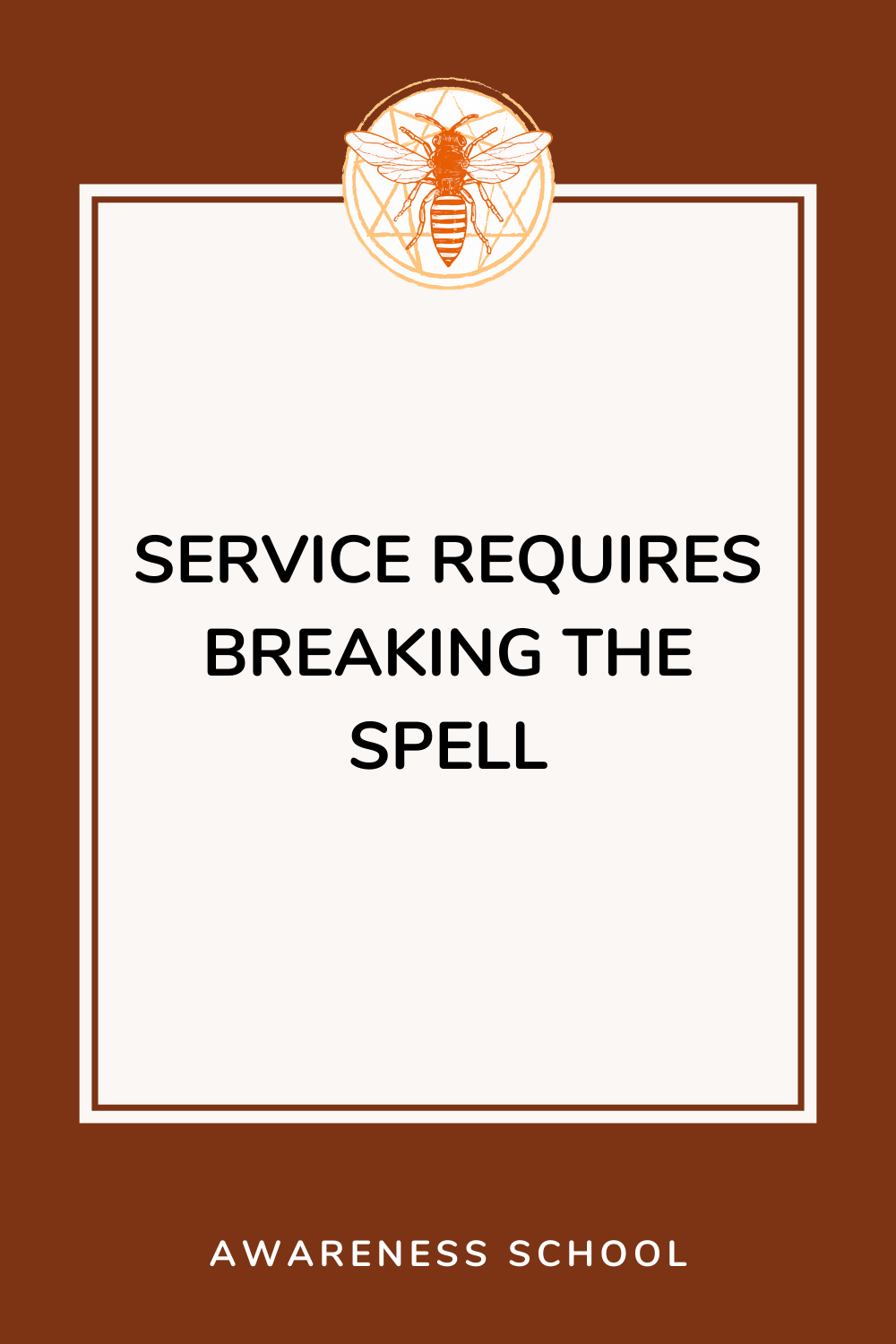Service Requires Breaking the Spell
Oct 29, 2019
In studying J.G. Bennet’s seven lines of work (specifically the third line about service) our group discovered more about identification and how it keeps us from true service and sacrifice. Service cannot exist without assimilation and struggle (the first two lines). With anything, we must learn to assimilate information through our own experience, which is in direct relation to how we understand and implement intentional inner struggle.
If we are to be of service, by the very definition, we must break the spell of identification with the role we are playing.
This calls us to look at duty and the importance of working for the good of all. Service comes in many forms from taking care of ourselves, eating well, and getting exercise to doing acts of bravery that serve a cause affecting everyone on the planet. Service requires us to see what is needed for the greater good and the results may manifest well after we die.
This line of work involves doing thankless tasks and takes “doing what it doesn’t want to do” to another level. We’re usually very attached to what we think service is and sometimes our motivation comes from how we see ourselves in that role and whether we are doing it well.
Identification, or attachment, comes into focus for each of us as we work to be in service to the greater good. Service requires sacrifice, meaning it is not self-serving in any form if it is to be true service. True service does not have tinges of feeling better about oneself. (For example, wondering if others are noticing or feeling resentment if it isn’t noticed.)
Identification has to do with roles and how we are wrapped up in the right and wrong or success and failure of those roles. We get bent out of shape from other people’s actions that disturb how we see ourselves. Those roles with which we are identified might be partner, co-worker, parent-to-be, artist, parent, employee, elected official and many many other roles. Identified in our roles, we see others’ actions in regard to how well we are doing our job, for example. Our kids,’ clients,’ employees’ actions become reflections of how well we are doing as a parent, coach, boss etc.
Our identity is wrapped up in the results and outcomes of the roles we play.
If we are upset and anxiety-ridden about something someone else is doing, one can rest assured that something of our own identity is in the mix. We may want to help someone so they don’t fail, but in the end, we shield them from consequences from which they could learn quite quickly. Children may find that they don’t have to do the work if a parent is doing it for them. I am not only talking about literal homework but the work of life. Parents may even carry an energetic burden that becomes hard to wean them from when it is time to grow up.
There may be an identification with being a good person, a thoughtful person, a responsible person, an intelligent or superior person, a savior, a good parent, a successful parent, etc. that all get in the way of service.
Someone might be making breakfast for their partner and not really want to do that. They feel resentful, feeling like the partner expects them to do this. The partner may not have asked to have breakfast made for them and simply feels like a kind act is being done. However, the person making the breakfast is not acting out of service, but trying to fulfill a picture they have of themselves…their identification or attachment to how they believe they “should be”. The action then becomes about fulfilling their picture of themselves and their identification with a role, not about doing the thoughtful thing.
We can see that our actions may not be choices at all, nor true acts of service because they are woven into a web of identification. That identification is the result of underlying misconceptions of self, the need to be loved, the compensation for inadequacy, or insecurity (just to name a few!)
Seeing one’s own identification with a role will lead to understanding these underlying chief features within us.
Bennett makes a wonderful point that we can assess through our own self-observation and experimentation. One cannot externally consider or be of service in any given situation unless we learn to struggle with our own internal considering. Internal considering is seeing the world in terms of only ourselves. It is “slavery to the opinion of others” as stated by Bennett himself. When we internally consider, it’s all about us. In this case, others’ actions or non-actions are perceived as directed at us personally and we cannot see any other possible motivation.
When we struggle to see our own internal considering, we get closer to understanding how we are identified with our roles. We see how our success or failure of that role comes to have so much importance. After all, it’s about us under this spell and has nothing to do with what other people’s actions.
It is possible to do things in service, but to do so requires doing something without being identified with it. In service, we are not doing something to gain points. Those actions may even be of a disservice because we enable others. They end up not having to face their own difficulties because we do it for them in order to satisfy and complete how we see ourselves.
Work on oneself is learning to see our states of identification. We strive to recognize and understand our internal considering in a present moment in order to become free of our state of identification. If not, our sense of duty turns into our need to fulfill our own picture of ourselves.
When each of us can truly begin to assimilate how we operate under the spell of identification, we have a chance to be of real service to humanity. It’s not done through acts that change large groups of people, their beliefs, or systems, or isms.
It must come from individual freedom.
That is service in itself.

FREE LIGHT GRID MEDITATION
Receive a free Light Grid Meditation and sign up for our weekly email, which delivers our latest blog post, Awareness School news and shamanic wisdom to your inbox every Thursday.
We will never spam you or sell your email address





